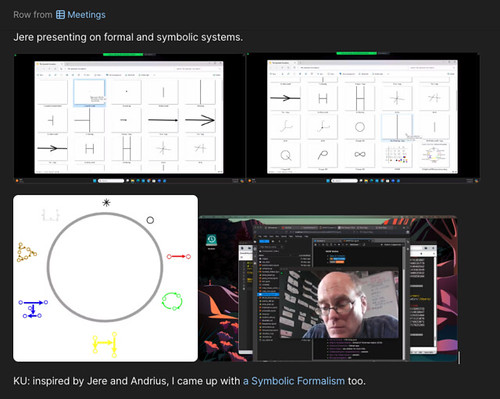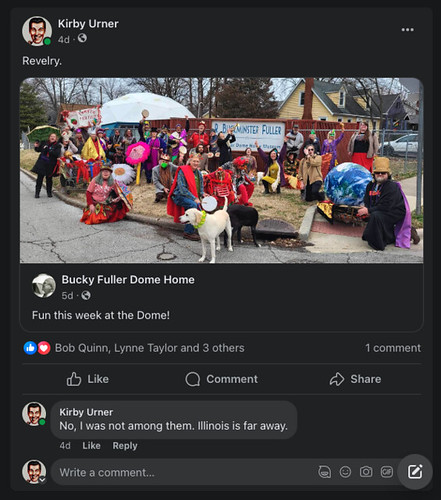Thursday, April 25, 2024
Anthropology Talk
Tuesday, April 23, 2024
Philosophy Talk
[ continuing a discussion thread at the M4W Coda ]
Wednesday, April 17, 2024
Tuesday, April 16, 2024
Taxonomy of Surprise
In some backwaters of philosophy, it's still problematic to associate brain states with concepts as multifarious as "surprising", which we furthermore doubt needs referents in the form of "feelings" to anchor its meaning, any more than "accidental" would need mooring in the feelings zone.
Saturday, April 13, 2024
Friday, April 12, 2024
Pro Human PR
Friday, April 5, 2024
Thursday, April 4, 2024
Wednesday, April 3, 2024
Tuesday, April 2, 2024
Mike Acerra Interviews Kirby
Saturday, March 30, 2024
Monday, March 25, 2024
Mental Models
Wednesday, March 20, 2024
Knowledge Engineering Study Group
Tuesday, March 19, 2024
Sunday, March 17, 2024
Tuesday, March 12, 2024
Friday, March 1, 2024
The US Civil War: A Study in Failed Social Engineering
Tuesday, February 27, 2024
Wednesday, February 21, 2024
Monday, February 19, 2024
Saturday, February 17, 2024
Philosophy Book Clubs
Some of us have studied The Metaphysical Club, which graphs a school of thought usually labeled as American pragmatism. At the outset, we're reminded how this layer of American heritage was forged in the US Civil War.
Readers in the far future, meaning in the 21st Century say, tend to forget all the nuances that swirled in the wake of the US's establishment as a nation-state, still very much in the process of spreading westward. To what extent would additional states, in the process of being added, permit the institution of slavery within their midst?
Accompanying acts of emancipation, on through the Civil Rights period, was the rise of mechanization, including escalators and elevators and the possibility of high rises (some qualifying as "skyscrapers"). In both the lineages of the pragmatists and the transcendentalists came Buckminster Fuller (the grand nephew of Margaret Fuller) with his forward-looking "energy-slave" concept: our machines would slave for humanity, increasingly effectively, freeing humanity itself from the scourge of slavery.
We would still need skilled professionals, people who knew how to leverage their work with automation. These would not be slaves however, so much as the master faculty and apprentice students of an emergent "global university" (another metaphor for Spaceship Earth).
Over at the Trim Tab Book Club, we've been alternately reading books by, and then about, said Buckminster Fuller, a prominent and prophetic futurist through much of the 20th Century. His ideas about a "design science revolution" anticipated the advance of "copyleft" policies among source code engineers.
I'm signed up for Sociology through what I'm seeing as within the NPU framework, in turn friendly with my School of Tomorrow based here in Oregon (NPU and PSU are linked in my thinking).
It's through that reading program, undertaken with other scholars online, that I was cued regarding The Metaphysical Club as relevant background reading. We're interested in continuing to stream these streams.
Thursday, February 15, 2024
Course Viewing
Speaking of pronouns (aren’t we always), the blob arrogantly assumes it speaks for Americans, whereas it’s just one more ethnicity, characterized by the usual Manifest Destiny mental illness. We are not an empire. We’re a conquered people struggling to win our freedom. We Americans, that is.
Sunday, February 11, 2024
Saturday, February 10, 2024
Friday, February 2, 2024
Modes of Reasoning
If you're like me, you admired the fictional Sherlock Holmes for his powers of deduction.
- induction gives us discoveries (which could be wrong)
- deduction gives us valid claims if the premises are true
- abduction gives us explanations (which could be wrong)
Computer Generated Hypertoons
I'm always wondering what a production house with some serious animators could make from my primitive "hypertoon" concept.
The idea is a simple one: think of a smooth transformation between A and B, nevermind yet what exactly is transforming. Label A and B as "key frames". Now imagine scenarios A to C and B to C. We now have a triangle. A point D with scenarios to A, B, C would now complete a tetrahedron.
A "scenario" could be like a cuboctahedron (A) twist-contracting into an icosahedron (B) ala the Jitterbug Transformation. That icosahedron (A) could then spin around 31 axes (opposite corners, mid-edges, face centers) yielding a great circle network (C). The network (C) could then shift, with some circles staying, others forming, others fading, to give the 25 great circles of the cuboctahedron (D). Add A to D. D to B might involve some kind of global sharing.
The hypertoon "playhead" displays scenarios between key frames. When it gets to a key frame, a decision is made, perhaps randomly, perhaps weighted, and a next scenario gets played. There's a sense of smooth transformations throughout, as the viewer visually tours the "space" of interconnecting scenarios. The network might be compared to a spaghetti ball.
Key frames that link to themselves, i.e. that start and end on the same frame, might sometimes run a number of times in a loop.
Search on "hypertoons" in the search box at the upper left for more, including some running examples.







